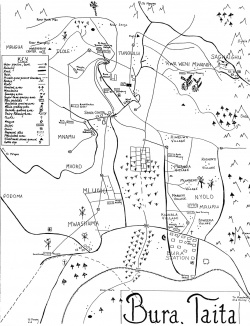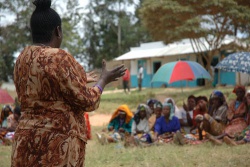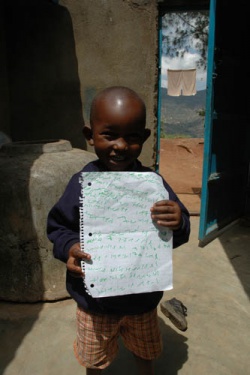OLPCorps Mass Kenya
Vision
The OLPCorps Mass Kenya project will revolutionize the way Bura children learn. By using XO laptops to document oral histories in the Kidawida language, the children will play a significant role in preserving the language and culture of their people and forge new relationships with their elders. They will be empowered to conceptualize their role in language preservation, creating a basic Kidawida picture dictionary and laying the foundation for a Kidawida - English dictionary.
Mission
This project will provide the community with new models and methods of teaching, learning, and cultural preservation. Resources limit Bura schools, which rely primarily on rote memorization; students are considered “receptacles” to be filled with information. Providing each child with a computer can change this: children will learn by doing, and by teaching one another and their community. In this way they will become active collaborators in the construction of knowledge.
The project emphasizes youth as the facilitators of discussion and the creators of valuable communal media. It expands learning beyond the classroom and develops students’ literacy skills. By recording oral histories and creating dictionaries, children will provide a valued resource for their community while learning to use life-changing technology. XO laptops become tools that encourage inter-generational dialogue for linguistic and cultural preservation and learning of valuable skills.
Bura
The people of Bura are members of an ethnic and linguistic minority, numbering approximately 250,000. Their primary language is Kidawida, yet Kiswahili is increasingly spoken and English is used in school. There are no Kidawida dictionaries in print, and the language is in danger of being lost.
The culture is also changing rapidly. Ten years ago, running water, electricity and telephones were rare; now electricity has reached a growing number of homes. Family and social structures are transforming as men migrate to Mombasa for employment. Still the people of Taita are proud of their heritage and actively try to preserve it through song, dance, and oral history.
Weekly Plan
1: Set up server. Develop relationships with local leaders: meet with school administration, county council, district education officer, chief. Present the project to the community. Listen, learn and adapt.
2: Meet with teachers and education stakeholders. Hold workshops to familiarize teachers with laptops.
3 – 6: Familiarize students with and support teachers in using the computers. Implement project activities - interviewing, recording, photographing, writing - focused on cultural change. With the help of older siblings or students, the children will utilize the laptops to record the interviews and write up their stories in Kidawida, using phonetic transcriptions.
7 – 9: School break; run the project in the community. Help students prepare the dictionaries and work with teachers on integrating the computers into the curriculum.
Our Team
Our team of graduate students from Clark University and the University of Washington will work in partnership with the Greater Newburyport/ Bura Alliance (GNBA) to deliver 100 computers to Bura Primary School, Taita District, Kenya. Collectively, our Bura team has many years of experience in elementary education, print and film media, language acquisition, and IT. One team member is familiar with the Linux operating system and Fedora. We are studying international development and have been trained in project management, strategic planning, and impact assessment. Each of us has worked in the developing world.
GNBA, which has a seventeen-year relationship with Bura, will support the team. GNBA has the capacity to support our efforts and assist the community after the project is completed.
Sustainability
Teachers and most young people speak English. Older students, siblings, and students at the nearby teacher-training college will interpret between Kidawida and English; this will help saturate the technology into the community.
For sustainability, we will train local teachers and stakeholders to maintain the network and integrate the laptops into classroom activities. We will also use the computers to create IT training materials.
We will nurture the collaboration between GNBA, Bura, and Clark University. Clark hosts a well-respected program in International Development and Social Change, and this partnership will provide future interns to continue this collaboration. GNBA will provide financial and volunteer support, linking project participants with Kenyan and international resources.
Finally, we will develop monitoring and evaluation methods with local community members and teachers-in-training to examine how laptops empower children and support a constructivist approach to teaching and learning. This research will inform the sustainability of the project, which may serve as a pilot for other schools in Taita and Kenya.
Links
- Read about our team
- Check out our budget
Back to OLPCorps Africa


